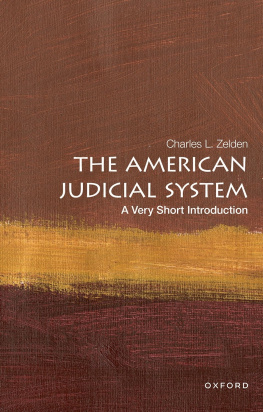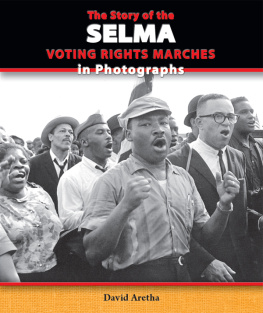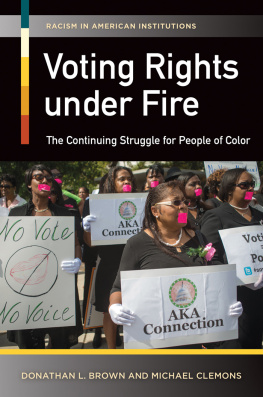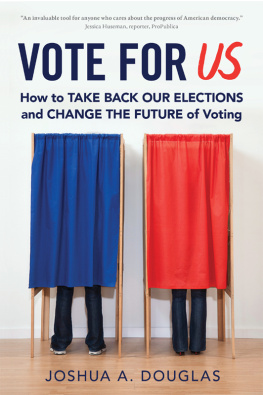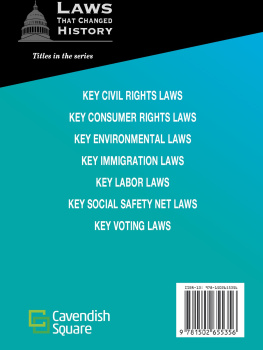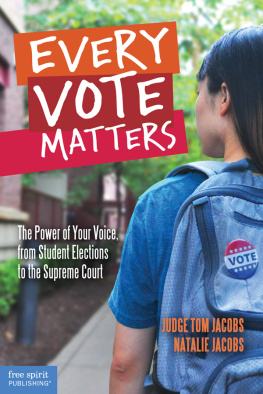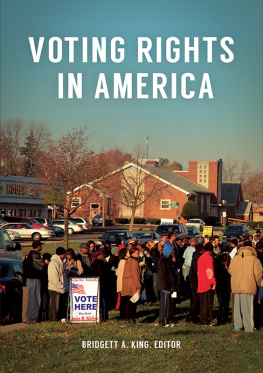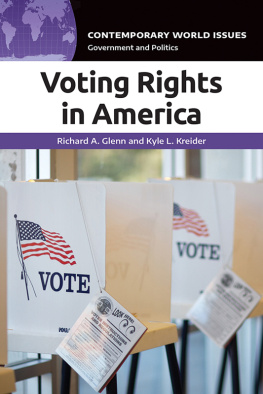Cover
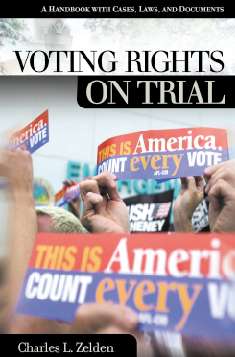
| title | : | Voting Rights On Trial : A Handbook With Cases, Laws, and Documents On Trial |
| author | : | Zelden, Charles L. |
| publisher | : | ABC-CLIO |
| isbn10 | asin | : | 1576077942 |
| print isbn13 | : | 9781576077948 |
| ebook isbn13 | : | 9781576077955 |
| language | : | English |
| subject | Suffrage--United States, Voting--United States. |
| publication date | : | 2002 |
| lcc | : | KF4891.Z45 2002eb |
| ddc | : | 342.73/072 |
| subject | : | Suffrage--United States, Voting--United States. |
Page i
Voting Rights ON TRIAL
Page ii
Other books in ABC-CLIOs On Trial Series
Charles L. Zelden, Series Editor
Constitutional Change on Trial, Richard B. Bernstein
Gay Rights on Trial, Lee Walzer
The Human Body on Trial, Lynne Curry
Native American Sovereignty on Trial, Bryan Wiedenthal
Pornography on Trial, Thomas Mackey
Racial Violence on Trial, Christopher Waldrep
Page iii
Voting Rights ON TRIAL
A Handbook with Cases, Laws, and Documents
Charles L. Zelden

Santa Barbara, California
Denver, Colorado
Oxford, England
Page iv
Copyright 2002 by Charles L. Zelden
All rights reserved. No part of this publication may be reproduced, stored in a retrieval system, or transmitted, in any form or by any means, electronic, mechanical, photocopying, recording, or otherwise, except for the inclusion of brief quotations in a review, without prior permission in writing from the publishers.
Library of Congress Cataloging-in-Publication Data
Zelden, Charles L., 1963Voting rights on trial : a handbook with cases, laws, and documents / Charles L. Zelden.
p. cm. (On trial)
Includes bibliographical references and index.
ISBN 1-57607-794-2 (hardcover); 1-57607-795-0 (e-book)
1. SuffrageUnited States. 2. VotingUnited States. I. Title. II. Series.
KF4891 .Z45 2002
342.73072dc21
2001006956
07 06 05 04 03 02 01 10 9 8 7 6 5 4 3 2 1
ABC-CLIO, Inc.
130 Cremona Drive, P.O. Box 1911
Santa Barbara, California 93116-1911
This book is printed on acid-free paper.
Manufactured in the United States of America
Page v
Contents
Series Foreword, vii
Preface, xi
Acknowledgments, xv
PART ONE
1 Introduction,
The Strange Career of Voting in the United States,
The Right to Vote: A Short History of a Contested Right,
Conclusion,
References and Further Reading,
2 Historical Background,
Vote Denial: Democracys Dark Secret,
Conclusion,
References and Further Reading,
3 Cases,
The Courts Say No to Expanded Voting Rights,
The Fall of the All-White Primary,
Victory and Defeat in the Lower Federal Courts,
The One Person/One Vote Standard,
The Voting Rights Act of 1965 and the Attack on Race-Based Vote Denial,
Vote Dilution, Redistricting, and the Shift from At-Large Elections to Single-Member Districts,
The Conservative Reaction to Expanded Voting Rights,
Page vi
Conclusion,
References and Further Reading,
4 Impact and Legacy,
Equal Protection or Equal Effect? Voting Rights in the Twenty-first Century,
The Election the Judges Resolved: Bush v. Gore and the Debate over the Nationalization of Voting in America,
Conclusion,
References and Further Reading,
Part Two
Documents,
Foundations: The Constitution of the United States (1787),
The Courts Say No to Expanded Voting Rights: Elk v. Wilkins and Minor v. Happersett,
The Fall of the All-White Primary: Smith v. Allwright,
Victory and Defeat in the Lower Federal Courts: Terry v. Adams,
The One Person/One Vote Standard: Reynolds v. Sims,
Voting Rights Act of 1965,
Vote Dilution and the Shift from At-Large to Single-Member Districts: Allen v. State Board of Elections,
The Conservative Reaction to Expanding Voting Rights: Dissents in Reynolds and Allen; Majority in Shaw,
The Debate over Nationalization of Voting Rights: Bush v. Gore,
Key People, Laws, and Concepts,
Chronology,
Table of Cases,
Annotated Bibliography,
Index,
About the Author,
Page vii
Series Foreword
The volumes in the On Trial series explore the many ways in which the U.S. legal and political system has approached a wide range of complex and divisive legal issues over timeand in the process defined the current state of the law and politics on these issues. The intent is to give students and other general readers a framework for understanding how the law in all its various formsconstitutional, statutory, judicial, political, and customaryhas shaped and reshaped the world we live in today.
At the core of each volume in the series is a common proposition: that in certain key areas of American public life, we as a people and a nation are on trial as we struggle to cope with the contradictions, conflicts, and disparities within our society, politics, and culture. Who should decide if and when a woman can have an abortion? What rights, if any, should those with a different sexual orientation be able to claim under the Constitution? Is voting a basic right of citizenship, and if so, under what rules should we organize this rightespecially when the application of any organizing rules inevitably results in excluding some citizens from the polls? What about the many inconsistencies and conflicts associated with racial tensions in the country? These are just some of the complex and controversial questions that we as a people and a nation are struggling to answerand must answer if we are to achieve an orderly and stable society. For the answers we find to these disputes shape the essence of who we areas a people, a community, and a political system.
The concept of being on trial also has a second meaning fundamental to this series: the process of litigating important issues in a court of law. Litigation is an essential part of how we settle our
Page viii
differences and make choices as we struggle with the problems that confront us as a people and a nation. In the 1830s, Alexis de Tocqueville in his book Democracy in America noted there is hardly a political question in the United States which does not sooner or later turn into a judicial one (de Tocqueville, 270). This insight is as true today as it was in the 1830s. In The Litigious Society, Jethro K. Lieberman notes that to express amazement at American litigiousness is akin to professing astonishment at learning that the roots of most Americans lie in other lands. We have been a litigious nation as we have been an immigrant one. Indeed, the two are related (Lieberman 1983, 13). Arriving in the United States with different backgrounds, customs, and lifestyle preferences, we inevitably clashed as our contrasting visions of life in the United Statesits culture, society, and politicscollided. It was to the courts and the law that we turned as a neutral forum for peaceably working out these differences. For, in the United States at least, it is the courthouse that provides the anvil on which our personal, societal, and political problems are hammered out.
Next page

